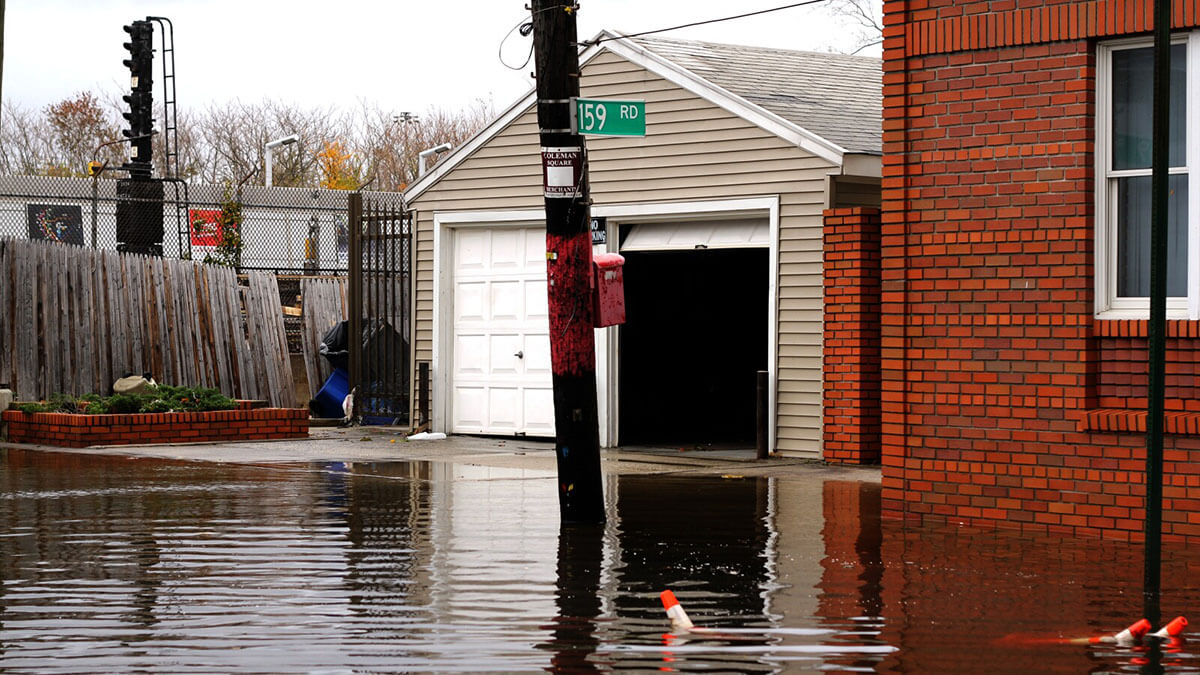Most rivers overflow about twice a year. However, there are some locations that experience floods much more often than others. Sometimes, floods completely destroy houses while in other cases, a flood might only leave a house with minor damage.
If your house has been flooded, you might be wondering if you can sell it. The answer will depend on a variety of factors, but in most cases, you can get away with selling a flooded house. Learning how to sell a flooded house isn’t hard, but there are some things you need to look out for and consider.
Keep reading and learn more about what you need to think about when selling a flood damaged house.
Discover your home’s worth online for free in minutes!
What you need to know about selling a flood-damaged house
Figuring out how to sell a house that has flooded, of course, is much more complicated than selling an ordinary house. You will also need to ask yourself a few questions when selling such a house. For example, is it better to repair the house and stay in it or just sell it?
More importantly, how much will a flood decrease the value of your home? Is it even worth selling a flooded home from a financial standpoint? What if no one wants to buy the house due to the extent of the damage?
In terms of home repairs, you will need to consider a few different factors. Depending on the extent of the damage, repairing the house may actually be impossible for you. In this case, the only option would be to sell the house.
However, if the damage is only minor, you might be able to do some repairs and keep from selling the house if you don’t want to. You will also need to think about if it is even possible to continue living in the house after the flood damage. For example, if your house went through a bad flood and several parts of the house were destroyed, you may not be able to safely live in that house anymore and you may have no choice but to sell the property.
The change in value
But what about the value of the house? You might be wondering, “Can I sell my flooded house and still make a profit?” Unfortunately, flood damage can take a good chunk out of your property’s value.
Even if your home was only slightly damaged by a flood, the water damage alone will decrease the value of your home. If much of the house was destroyed by the flood, the value of the home will go down even more. Of course, the worse the flooding is, the more drastic the decrease in value will be.
In some cases, the property’s value might decline as much as 30%. While this is certainly bad news for you, it isn’t all bad. You can still make some money by selling the house. This is in contrast to the money that you would need to spend to repair the house so that it is liveable again.
But if you do plan to sell your flood-damaged house, where should you start?
Find a service to help you
When it comes to selling a house that has been damaged by a flood, the last thing you should do is try to sell it on your own. If you try to do that, you will find that you won’t get very far and you might not even know where to start. That’s why seeking someone who can help you sell your house is so important.
Keep in mind that you will want to avoid your average real estate agent. An ordinary agent likely won’t know what to do with your flooded house either. Instead, you will want to seek out a very experienced and high-quality service or seller to help you like iBuyer.
Such a service will likely have experience selling flooded homes before and should be able to help you as much as possible. Besides having experience selling flooded homes, you should make sure that this service also knows all about the laws behind selling damaged homes and homes that may have structural problems. Preferably, the service should also have plenty of knowledge regarding the price of renovations for flooded homes as well as how to make a flooded property look appealing to potential buyers and real estate investors.
As long as you find a reputable home selling or buying service with this kind of knowledge and experience, you will be in good hands and you shouldn’t have to worry much about anything. Hiring a good service like iBuyer will also help put the price of the property into perspective. Be prepared for the service to tell you that you won’t be able to get very much money for your damaged home.
The benefits of finding a good service
Many house-selling services are trained at being able to come up with the right price for homes, including flooded or badly damaged homes. While you could try listing your property for a higher price, you will find that most people will not be willing to spend very much for a flooded home. The higher the price of a damaged piece of property is, the harder it will be to sell.
If you don’t mind sitting on the property for months at a time, this might not be a problem for you. However, if you want to part with the property as fast as possible, then it is best to go with the service’s recommendation and go with a lower price. Besides, a good service will also do all the work of communicating with potential buyers.
A skilled home-selling service can make even the most damaged of properties seem appealing. This is not to mention that you won’t have to communicate with the potential buyers yourself. This will give you more time to consider other factors concerning the sale of your flooded property.
But remember that such a service will mainly function to guide you through this process. If the service says something that you don’t agree, with you are free to disagree and do something else.
Be sure to disclose the severity of the damage
If you try to sell your home without disclosing that it has been flooded to the buyer, you could get in serious legal trouble. If you’re not careful, you might end up paying some very hefty fines and the buyer might even file a lawsuit against you. This, of course, is not something you want to deal with when you’re just trying to sell your house.
For that reason, you will need to be as clear as possible when disclosing the damage of the property. Again, a good home-selling service like iBuyer can help with that. In particular, your service should know all about the disclosure laws in your state and what you need to do to follow those laws when selling the property.
Keep in mind that disclosure laws for properties differ from state to state. What might be alright in one state might be illegal in another. Most states will require you to disclose certain information such as if the property has been flooded before, how often it has been flooded before, and so on. You might also have to disclose the location of your property such as if it is built on a floodplain or if it is near a reservoir.
You may also need to disclose whether or not your property is covered by flood insurance. If not, this may complicate matters further and may be difficult to financially deal with. Keep in mind that when you disclose all of this information to potential buyers that the information doesn’t have to be written in a scary way.
The details
While disclosures can be offputting for some buyers, you can word them in a way that doesn’t make them sound as threatening. After all, you don’t want to deter potential buyers by making the damages sound worse than they really are. However, you will also not want to undermine the damages either.
Instead, it is best to list the damage exactly as it is. That way, you won’t run into legal trouble if the buyer thinks that you were not honest in disclosing information about the property. For example, it is important to disclose how much water affected the home.
A few inches of water may not be anything for potential homebuyers to worry about. On the other hand, if three to four feet of water flooded your house, then this is a much more serious problem since the water penetrated a great deal of your house. You will also need to disclose any renovations you made after the flood, even if they were minor.
If you did not make any renovations or repairs after the flood, you will need to specify this as well. That way, the potential homebuyers will understand the full situation concerning the property. Then, they can make a decision whether to buy the home or not as it is.
Consider making some repairs on the property
If your house has been seriously damaged by a flood, you might find it very difficult to sell, even with the help of an experienced real estate service. After all, most people will not want to buy a property that is completely destroyed. Instead, some might be willing to buy a property that has only a bit of damage.
This might sound like a hopeless situation for you if your property has been significantly destroyed by a flood. However, you can improve the situation by doing some repairs. It might sound counterintuitive to repair a home that you’re going to sell, but doing so can actually make the whole process a lot easier for you.
Keep in mind that you should not repair your entire house. Instead, you just need to make it habitable so that potential homebuyers will have more of an interest in it. It is best to stick with relatively minor repairs.
That way, the condition of the house will increase but you won’t have to invest too much money into it. Keep in mind that you might even be able to make your money back on certain repairs since some repairs can actually increase the value of your home. Again, it is important to have a good service on your side to help you decide what repairs are important to make.
Choosing the repairs
For example, having the floors repaired is very important, especially if the home is full of carpeting. Flooded carpeting will only contribute to mold in the home. Once mold takes hold, it can become a health hazard for those with asthma or bad allergies, and mold, in general, will make it much less likely that people will consider buying your home.
For that reason, it is best to repair the floors before selling the house. A mold remediation certificate may make the property more appealing to potential buyers or investors. If the walls have visible signs of water damage, consider repainting them.
Repainting isn’t expensive and it can make the property look much better and fresher.
How to sell a flooded house with ease
Learning how to sell a flooded house doesn’t have to be difficult as long as you know what to do and where to start. You should always start with a good home-selling service like iBuyer.com on your side to walk you through the disclosure laws, necessary repairs, and so on.
You should also make sure that you disclose everything to potential buyers so you don’t get into legal trouble.




